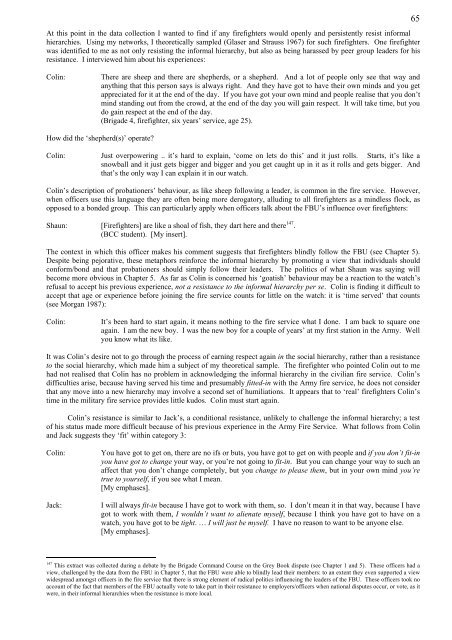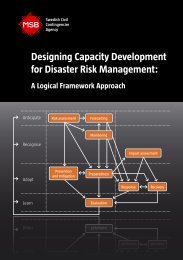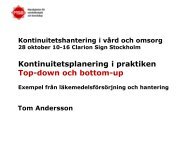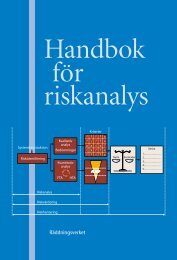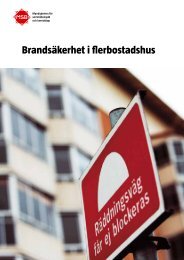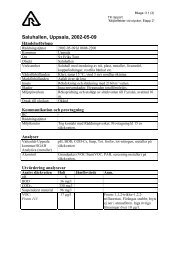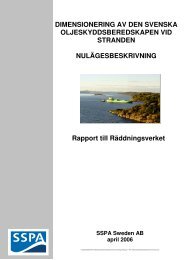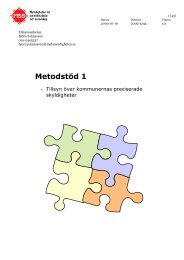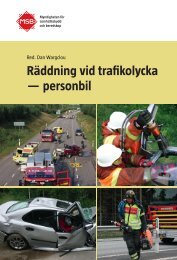One more last working class hero
One more last working class hero
One more last working class hero
Create successful ePaper yourself
Turn your PDF publications into a flip-book with our unique Google optimized e-Paper software.
At this point in the data collection I wanted to find if any firefighters would openly and persistently resist informal<br />
hierarchies. Using my networks, I theoretically sampled (Glaser and Strauss 1967) for such firefighters. <strong>One</strong> firefighter<br />
was identified to me as not only resisting the informal hierarchy, but also as being harassed by peer group leaders for his<br />
resistance. I interviewed him about his experiences:<br />
65<br />
Colin:<br />
There are sheep and there are shepherds, or a shepherd. And a lot of people only see that way and<br />
anything that this person says is always right. And they have got to have their own minds and you get<br />
appreciated for it at the end of the day. If you have got your own mind and people realise that you don’t<br />
mind standing out from the crowd, at the end of the day you will gain respect. It will take time, but you<br />
do gain respect at the end of the day.<br />
(Brigade 4, firefighter, six years’ service, age 25).<br />
How did the ‘shepherd(s)’ operate?<br />
Colin: Just overpowering .. it’s hard to explain, ‘come on lets do this’ and it just rolls. Starts, it’s like a<br />
snowball and it just gets bigger and bigger and you get caught up in it as it rolls and gets bigger. And<br />
that’s the only way I can explain it in our watch.<br />
Colin’s description of probationers’ behaviour, as like sheep following a leader, is common in the fire service. However,<br />
when officers use this language they are often being <strong>more</strong> derogatory, alluding to all firefighters as a mindless flock, as<br />
opposed to a bonded group. This can particularly apply when officers talk about the FBU’s influence over firefighters:<br />
Shaun: [Firefighters] are like a shoal of fish, they dart here and there 147 .<br />
(BCC student). [My insert].<br />
The context in which this officer makes his comment suggests that firefighters blindly follow the FBU (see Chapter 5).<br />
Despite being pejorative, these metaphors reinforce the informal hierarchy by promoting a view that individuals should<br />
conform/bond and that probationers should simply follow their leaders. The politics of what Shaun was saying will<br />
become <strong>more</strong> obvious in Chapter 5. As far as Colin is concerned his ‘goatish’ behaviour may be a reaction to the watch’s<br />
refusal to accept his previous experience, not a resistance to the informal hierarchy per se. Colin is finding it difficult to<br />
accept that age or experience before joining the fire service counts for little on the watch: it is ‘time served’ that counts<br />
(see Morgan 1987):<br />
Colin:<br />
It’s been hard to start again, it means nothing to the fire service what I done. I am back to square one<br />
again. I am the new boy. I was the new boy for a couple of years’ at my first station in the Army. Well<br />
you know what its like.<br />
It was Colin’s desire not to go through the process of earning respect again in the social hierarchy, rather than a resistance<br />
to the social hierarchy, which made him a subject of my theoretical sample. The firefighter who pointed Colin out to me<br />
had not realised that Colin has no problem in acknowledging the informal hierarchy in the civilian fire service. Colin’s<br />
difficulties arise, because having served his time and presumably fitted-in with the Army fire service, he does not consider<br />
that any move into a new hierarchy may involve a second set of humiliations. It appears that to ‘real’ firefighters Colin’s<br />
time in the military fire service provides little kudos. Colin must start again.<br />
Colin’s resistance is similar to Jack’s, a conditional resistance, unlikely to challenge the informal hierarchy; a test<br />
of his status made <strong>more</strong> difficult because of his previous experience in the Army Fire Service. What follows from Colin<br />
and Jack suggests they ‘fit’ within category 3:<br />
Colin:<br />
Jack:<br />
You have got to get on, there are no ifs or buts, you have got to get on with people and if you don’t fit-in<br />
you have got to change your way, or you’re not going to fit-in. But you can change your way to such an<br />
affect that you don’t change completely, but you change to please them, but in your own mind you’re<br />
true to yourself, if you see what I mean.<br />
[My emphases].<br />
I will always fit-in because I have got to work with them, so. I don’t mean it in that way, because I have<br />
got to work with them, I wouldn’t want to alienate myself, because I think you have got to have on a<br />
watch, you have got to be tight. … I will just be myself. I have no reason to want to be anyone else.<br />
[My emphases].<br />
147 This extract was collected during a debate by the Brigade Command Course on the Grey Book dispute (see Chapter 1 and 5). These officers had a<br />
view, challenged by the data from the FBU in Chapter 5, that the FBU were able to blindly lead their members: to an extent they even supported a view<br />
widespread amongst officers in the fire service that there is strong element of radical politics influencing the leaders of the FBU. These officers took no<br />
account of the fact that members of the FBU actually vote to take part in their resistance to employers/officers when national disputes occur, or vote, as it<br />
were, in their informal hierarchies when the resistance is <strong>more</strong> local.


